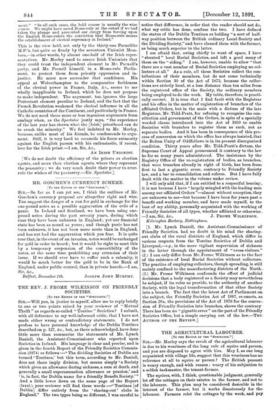THE REV. J. FROME WILKINSON ON FRIENDLY SOCIETIES.
[TO THE EDITOR OF THE "SPECTATOR."]
SIR,—Will you, in justice to myself, allow me to reply briefly to one or two points raised by your reviewer of "Mutual Thrift" as regards so-called " Tontine " Societies ? I submit, with all deference to my well-informed critic, that I have not made either wrong or contradictory statements. I do not profess to have personal knowledge of the Dublin Tontines described on p. 127, &c., but, as there acknowledged, have done little more than summarise the statements of Mr. Lynch Daniell, the Assistant-Commissioner who reported upon Societies in Ireland. His language is clear and precise, and is given in the fourth Report of the Friendly Societies Commis- sion (1874) as follows :—" The dividing Societies of Dublin are termed ' Tontines,' but this term, according to Mr. Daniell, does not there imply division, but means simply a Society which gives an allowance during sickness, a sum at death, and generally a small superannuation allowance or pension,' and is, in fact, the Dublin name for a friendly Benefit Society." And a little lower down on the same page of the Report (1xxxi.), your reviewer will find these words :—" Tontines [of Dublin] differ entirely from the 'sharing-out' clubs in England." The two types being so different, I was careful to
notice that difference, in order that the reader should not do, what my critic has done, confuse the two. I have defined the status of the Dublin Tontines as holding "a sort of half- way position between the British ordinary Local Society and the Dividing Society," and have classed them with the former, as being much superior to the latter.
I am afraid that, owing chiefly to want of space, I have " shunted " local Burial Societies, and left a good many of them on the "siding." I am, however, unable to allow "that there are a vast number of Burial Societies employing no col- lectors at all." As a rule, all these Societies collect the con- tributions of their members, but do not come technically within Section 30 of the Act of 1875, because the collec- tions are strictly local, at a less distance than ten miles from the registered office of the Society, the ordinary members, being employed to do the work. My table, therefore, is practi- cally correct. It is true that I find fault with the Registrar and his office in the matter of registration of branches of the affiliated Orders, but in the main with a dictum of the late Registrar, Mr. Tidd-Pratt, for refusing to recognise the con- stitution and government of the Orders, in spite of a specially worded clause introduced into the Act of 1850 to enable Societies with branches to register them as such, not as separate bodies. And it has been in consequence of this pro- cess of conversion on which the office has always insisted, that the Bolton Unity of Oddfellows is in its present disorganised condition. Thirty years after Mr. Tidd-Pratt's dictum, the Supreme Court of Appeal pronounced it contrary to the law he for so many years administered. The insistance by the Registry Office of the re-registration of bodies, as branches, that were branches already in right of birth, has been from first to last a gigantic error, contrary to Friendly Society law, and a bar to consolidation and reform. But I have fully dealt with the matter in the volume under review.
I will only add that, if I am entitled to a respectful hearing,. it is not because I have "largely mingled with the leading men among our affiliated Orders "—almost without exception, they are unknown to me—but because I have been for years past a benefit and working member, and have made myself, to the best of my ability, personally acquainted with the working of Friendly Societies of all types, whether affiliated or otherwise..
—I am, Sir, &c., J. FROMM WILKINSON. Kilvington Rectory, Nottingham.
[1. Mr. Lynch Daniell, the Assistant-Commissioner of Friendly Societies, had no doubt in his mind the sharing- out clubs of the rural districts of England, which differ in various respects from the Tontine Societies of Dublin and Liverpool,--e.g., in the more vigilant supervision of sicknesn in the latter through the appointment of "cross-visitors."
(2.) I can only differ from Mr. Frome Wilkinson as to the fact of the existence of local Burial Societies without collectors. The practice of employing collectors, though spreading, is still mainly confined to the manufacturing districts of the North- (3.) Mr. Frome Wilkinson confounds the effect of judicial decisions that a body registered as a Society may nevertheless: be subject, if its rules so provide, to the authority of another Society, with the legal transformation of that other Society into a branch. The fact that the latest Act of Parliament on the subject, the Friendly Societies Act of 1887, re-enacts, as Section 29A, the provisions of the Act of 1876 for the conver- sion of Friendly Societies into branches, shows the contrary There has been no "gigantic error" on the part of the Friendly Societies Office, but a simple carrying out of the law.—TRE.
AUTHOR OP THE REVIEW.]










































 Previous page
Previous page